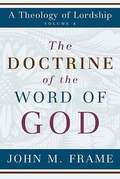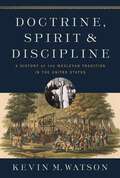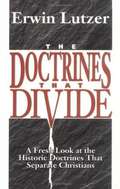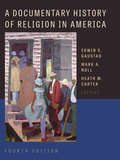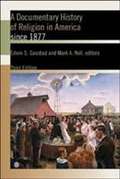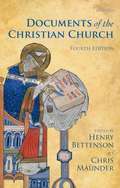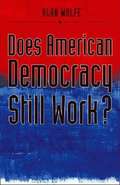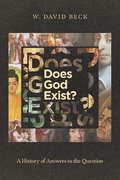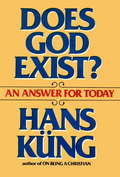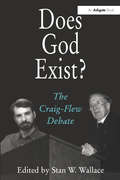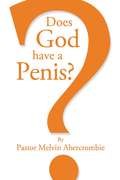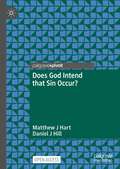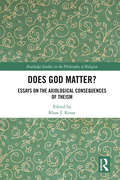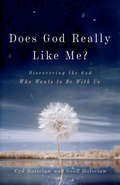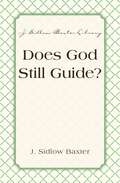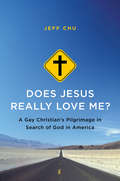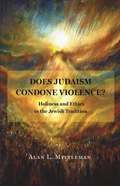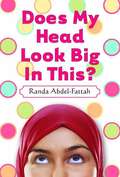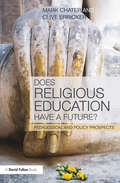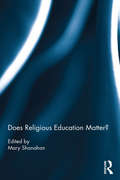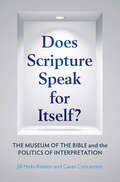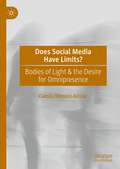- Table View
- List View
The Doctrine of the Word of God (A Theology of Lordship, Volume #4)
by John M. FrameThis book discusses God's word in modern theology and how God's word comes to us as his controlling power, meaningful authority, and personal presence.
Doctrine, Spirit, and Discipline: A History of the Wesleyan Tradition in the United States
by Kevin M. WatsonThe definitive history of the Wesleyan movement in the United States.An expansive, substantive history of the Wesleyan tradition in the United States, Doctrine, Spirit, and Discipline offers a broad survey of the Methodist movement as it developed and spread throughout America, from the colonial era to the present day.It also provides an theological appraisal of these developments in light of John Wesley's foundational vision. Beginning with Wesley himself, Watson describes the distinctiveness of the tradition at the outset. Then, as history unfolds, he identifies the common set of beliefs and practices which have unified a diverse group of people across the centuries, providing them a common identity through a number of divisions and mergers.In the midst of the sweeping changes happening in Methodism and the pan-Wesleyan movement today, Watson shows that the heart of the Wesleyan theological tradition is both more expansive and substantive than any singular denominational identity."A fresh, panoramic overview of the history of the Methodist movement. . . Promises to be a standard textbook on the history of Methodism for years to come." —TIMOTHY C. TENNENT, Asbury Theological Seminary
The Doctrines of Election and Justification
by A. W. PinkStudy of the doctrines of election and justification in Christianity
The Doctrines That Divide: A Fresh Look at the Historic Doctrines That Separate Christians
by Erwin W. LutzerLutzer examines various controversies that exist within the broad spectrum of Christianity, presenting the issue and the biblical understanding of the doctrines.
A Documentary History of Religion in America
by Edwin S. Gaustad, Heath W. Carter, Mark A. NollUp-to-date one-volume edition of a standard textFor decades students and scholars have turned to the two-volume Documentary History of Religion in America for access to the most significant primary sources relating to American religious history from the sixteenth century to the present. This fourth edition—published in a single volume for the first time—has been updated and condensed, allowing instructors to more easily cover the material in a single semester.With more than a hundred illustrations and a rich array of primary documents ranging from the letters and accounts of early colonists to tweets and transcripts from the 2016 presidential election, this volume remains an essential text for readers who want to encounter firsthand the astonishing scope of religious belief and practice in American history.
A Documentary History of Religion in America since 1877
by Mark A. Noll Edwin S. GaustadThe second volume covers the period from when the dust of the Civil War has settled to the dawn of the 21st century. The documents are almost all by people actively engaged in religion, and so reflect the course of religion itself rather than an external view of it. The chronological chapters focus on trends or conflicts during specific periods. Annotation ©2004 Book News, Inc., Portland, OR (booknews.com)
The Documents of the Christian Church (Fourth Edition)
by Henry Bettenson Chris MaunderHenry Bettenson published the first two editions of Documents of the Christian Church in 1943 and 1963, respectively. The selections were so well chosen that the Documents became a standard text book which many theologians and church historians will remember from their undergraduate days.
Does American Democracy Still Work?
by Alan WolfeThe past few decades have brought a shift in the nature of American democracy--an alarming shift that threatens such liberal democratic values as respect for pluralism, acceptance of the separation of powers, and recognition of the rights of opposition parties. In this insightful book, political scientist Alan Wolfe identifies the current political conditions that endanger the quality of our democracy. He describes how politics has changed, and he calls for a democracy protection movement designed to preserve our political traditions not unlike the environmental protection movement's efforts to safeguard the natural world. Voters who know little about issues, leaders who bend rules with little fear of reprisal, and political parties that are losing the ability to mobilize citizens have all contributed to a worrisome new politics of democracy, Wolfe argues. He offers a brilliant analysis of how religion and morality have replaced political and economic self-interest as guiding principles, and how a dangerous populism promotes a radical form of elitism. Without laying blame on one party or ideology and without claiming that matters will improve with one party or the other in office, Wolfe instead suggests that Americans need to understand the danger their own indifference poses and take political matters more seriously.
Does God Exist?: A History of Answers to the Question
by W. David BeckDoes God exist? Throughout the history of philosophical and theological reflection, this fundamental question has prompted a range of responses. In one incisive volume, philosopher W. David Beck offers a narrative of pre-Christian, Jewish, Buddhist, Christian, and Islamic arguments for God's existence. Here, readers will encounter both classical and contemporary arguments, including cosmological, teleological, moral, and ontological arguments along with commentary from the author. Explore the history of answers to an essential question and add your own reflections to this ongoing conversation.
Does God Exist?: The Craig-Flew Debate
by Stan W. WallaceThis book presents the most recent debates by leading contemporary philosophers of enduring themes and issues concerning the question of God's existence. William Craig and Antony Flew met on the 50th anniversary of the famous Copleston/Russell debate to discuss the question of God's existence in a public debate. The core of this book contains the edited transcript of that debate. Also included are eight chapters in which other significant philosophers - Paul Draper, R. Douglas Geivett, Michael Martin, Keith Parsons, William Rowe, William Wainwright, Keith Yandell and David Yandell - critique the debate and address the issues raised. Their substantial and compelling insights complement and further the debate, helping the reader delve more deeply into the issues that surfaced. In the two final chapters, Craig and Flew respond and clarify their positions, taking the debate yet one step further. The result of these many contributions is a book which provides the reader with a summary of the current discussion and allows one to enter into the dialogue on this central question in the philosophy of religion.
Does God Exist? An Answer for Today
by Hans Kung Edward QuinnDoes God exist? We are putting all our cards on the table here. The answer will be: "Yes, God exists." And as human beings in the twentieth century we certainly can reasonably believe in God, even in the Christian God. And perhaps more easily today than a few decades or even centuries ago.
Does GOD have a Penis?
by Melvin AbercrombieEverything in creation came from a female. In Hebrew she was known as Shekhinah, the Goddess, Queen of Heaven. Everything in creation will eventually die, they will all go back to a female, we simply call her "Mother Earth". She is Auriel, first born daughter of the Goddess. This is their story.
Does God Intend that Sin Occur?
by Matthew J Hart Daniel J HillThis open access book argues, from a detailed consideration of the Christian Scriptures, that God intends that sin occur. It swims against the tide of current thinking in philosophy of religion, arguing for an unfashionable conclusion. The book begins by considering the history of views on the question, paying particular attention to the Reformed or Calvinistic tradition. The heart of the book is a detailed examination of key passages from the Christian Scriptures that, it is argued, show that God does intend that sin occur. It also discusses in detail two alternative views that could be used to reinterpret these texts, one view that God intends only that the substratum of the sinful action occur, not the sin itself, and the other that God acts because a sin will occur but not intending that that sin occur. The book argues that these interpretative strategies, even when combined together, do not produce a plausible interpretation of the texts adduced.
Does God Matter?: Essays on the Axiological Consequences of Theism (Routledge Studies in the Philosophy of Religion)
by Klaas KraayDoes God Matter? features eleven original essays written by prominent philosophers of religion that address this very important, yet surprisingly neglected, question. One natural way to approach this question is to seek to understand what difference God’s existence would—or does—make to the value of the world and the well-being of its inhabitants. The first essay sets the stage for the discussion of this topic. The three essays in Section I defend versions of pro-theism: the view that God’s existence would -- or does -- make things better than they would otherwise be. The four essays in Section II defend anti-theism: the view that God’s existence would, or does, make things worse than they would otherwise be. The three essays in Section III consider the interplay between the existential and axiological debates concerning the existence of God. This book presents important research on a growing topic in philosophy of religion that will also be of keen interest to scholars working in other areas of philosophy (such as metaphysics, epistemology, and value theory), and in other disciplines (such as religious studies and analytic theology).
Does God Really Like Me?: Discovering the God Who Wants to Be With Us
by Geoff Holsclaw Cyd HolsclawlikeDoes God Really Like Me?
Does God Still Guide? (J. Sidlow Baxter Library)
by J. Sidlow BaxterDoes God Still Guide? Or, more fully, what are the Essentials of Guidance and Growth in the Christian Life?
Does Jacob's Trouble Wear A Cross?: The Ancient Legacy of Christian Anti-Semitism
by Randall A. WeissWake up Christians! If taken in the spirit of truth and love (the same spirit in which it was written), this book will be a very clear trumpet blast that will cause sleepy Gentile Christians, like I was, to stir themselves and open their willfully closed eyes. Sleepy Gentile Christians with willfully closed eyes are those who while not anti-Semitic have simply not taken the time to find out that there has been a long history of hatred by so-called Christians against the Jewish people. Even the Sleepy Gentile Christians with willfully closed eyes know about the atrocities of Adolf Hitler, and they condemn such hellishly inspired brutality. But it will surprise many Christians to discover that some real Christians have also been anti-Semitic as well. For those who think that their anti-Semitic behavior is justified by their interpretations of the New Testament, this book is more than a trumpet blast. It carries within its pages the same hot breath of john the Baptist who said in no uncertain terms: "Repent." Randy Weiss, a Jewish/Christian scholar, has done an excellent job of compiling a very large amount of information and putting it into a clear, readable style. Mr. Weiss has given the Christian Church (made up of all people groups, Jews and Gentiles) a very potent medicine that if taken with an honest and open heart, will begin to heal the ignorance (and Hatred) of many Christians, and, we hope, the pain of many Jews. Rick Walston, Ph.D. President of Faraston Theological Seminary
Does Jesus Really Love Me?: A Gay Christian's Pilgrimage in Search of God in America
by Jeff ChuDoes Jesus Really Love Me?: A Gay Christian's Pilgrimage in Search of God in America is part memoir and part investigative analysis that explores the explosive and confusing intersection of faith, politics, and sexuality in Christian America. The quest to find an answer is at the heart of Does Jesus Really Love Me?—a personal journey of belief, an investigation, and a portrait of a faith and a nation at odds by award-winning reporter Jeff Chu. From Brooklyn to Nashville to California, from Westboro Baptist Church and their “God Hates Fags” protest signs, to the pioneering Episcopalian bishop Mary Glasspool—who proclaims a message of liberation and divine love, Chu captures spiritual snapshots of Christian America at a remarkable moment, when tensions between both sides in the culture wars have rarely been higher. Funny and heartbreaking, perplexing and wise, Does Jesus Really Love Me? is an intellectual, emotional, and spiritual pilgrimage that reveals a nation in crisis.
Does Judaism Condone Violence?: Holiness and Ethics in the Jewish Tradition
by Alan L. MittlemanA philosophical case against religious violenceWe live in an age beset by religiously inspired violence. Terms such as “holy war” are the stock-in-trade of the evening news. But what is the relationship between holiness and violence? Can acts such as murder ever truly be described as holy? In Does Judaism Condone Violence?, Alan Mittleman offers a searching philosophical investigation of such questions in the Jewish tradition. Jewish texts feature episodes of divinely inspired violence, and the position of the Jews as God’s chosen people has been invoked to justify violent acts today. Are these justifications valid? Or does our understanding of the holy entail an ethic that argues against violence?Reconstructing the concept of the holy through a philosophical examination of biblical texts, Mittleman finds that the holy and the good are inextricably linked, and that our experience of holiness is authenticated through its moral consequences. Our understanding of the holy develops through reflection on God’s creation of the natural world, and our values emerge through our relations with that world. Ultimately, Mittleman concludes, religious justifications for violence cannot be sustained.Lucid and incisive, Does Judaism Condone Violence? is a powerful counterargument to those who claim that the holy is irrational and amoral. With philosophical implications that extend far beyond the Jewish tradition, this book should be read by anyone concerned about the troubling connection between holiness and violence.
Does My Head Look Big In This?
by Randa Abdel-FattahWhen sixteen-year-old Amal decides to wear the hijab full-time, her entire world changes, all because of a piece of cloth ... Sixteen-year-old Amal makes the decision to start wearing the hijab full- time and everyone has a reaction. Her parents, her teachers, her friends, people on the street. But she stands by her decision to embrace her faith and all that it is, even if it does make her a little different from everyone else. Can she handle the taunts of "towel head," the prejudice of her classmates, and still attract the cutest boy in school? Brilliantly funny and poignant, Randa Abdel-Fattah's debut novel will strike a chord in all teenage readers, no matter what their beliefs.
Does Religious Education Have a Future?: Pedagogical and Policy Prospects
by Mark Chater Clive ErrickerThe place of religion in the modern world has changed significantly over the past two decades. This has been partially reflected in the academic study of religion, but little, if at all, in religious education. In addition, the place of RE in schools has been the subject of intense debate due to changes to the curriculum and school structure, as well as being part of wider debates on religion in the public sphere. Written by two highly experienced leading practitioners of RE, Does Religious Education have a Future? argues for a radical reform of the subject based on principles of pedagogy set free from religious concerns. It challenges teachers, researchers and educators to rethink their approaches to, and assumptions about, religious education, and enables them to see their work in a larger context that includes pedagogical ideas and political forces. The book offers readers fresh, provocative and expertly informed critical perspectives on: the global context of RE, debates about religion in public places, religion’s response to modernity, violent extremism, science and secularism; the evolving educational rationale for RE in schools; the legal arrangements for RE and their impact on the teaching of the subject; the pedagogy of teaching approaches in RE and their effect on standards and perceptions of the subject; the educational commitment of faith/belief communities, and how this influences the performance of RE. Does Religious Education have a Future? proposes a new attitude to the subject of religious education, and a new configuration of both its role and content. This book is essential reading for academics, advisers and policy makers, as well as teachers of RE at primary and secondary levels and trainee and newly qualified teachers.
Does Religious Education Matter?
by Mary ShanahanIn the current climate, and in an age of increasing hostility towards religion and the study of religion, religious education is a much-debated area. Bringing together an interdisciplinary team of contributors from the USA, Britain and Ireland, and Australia, representing a variety of religious perspectives, Does Religious Education Matter? provocatively demonstrates that it is vital that religious education is presented as it ’really’ is: a valuable and rich resource that, when taught and engaged with appropriately, stimulates essential qualities for global and responsible citizenship: critical thinking, tolerance, respect, and mutual understanding.
Does Scripture Speak for Itself?: The Museum of the Bible and the Politics of Interpretation
by Jill Hicks-Keeton Cavan ConcannonIs the Bible the unembellished Word of God or the product of human agency? There are different answers to that question. And they lie at the heart of this book's powerful exploration of the fraught ways in which money, race and power shape the story of Christianity in American public life. The authors' subject is the Museum of the Bible in Washington, DC: arguably the latest example of a long line of white evangelical institutions aiming to amplify and promote a religious, political, and moral agenda of their own. In their careful and compelling investigation, Jill Hicks-Keeton and Cavan Concannon disclose the ways in which the Museum's exhibits reinforce a particularized and partial interpretation of the Bible's meaning. Bringing to light the Museum's implicit messaging about scriptural provenance and audience, the authors reveal how the MOTB produces a version of the Bible that in essence authorizes a certain sort of white evangelical privilege; promotes a view of history aligned with that same evangelical aspiration; and above all protects a cohort of white evangelicals from critique. They show too how the Museum collapses vital conceptual distinctions between its own conservative vision of the Bible and 'The Bible' as a cultural icon. This revelatory volume above all confirms that scripture – for all the claims made for it that it speaks only divine truth – can in the end never be separated from human politics.
Does Social Media Have Limits?: Bodies of Light & the Desire for Omnipresence
by Camila Mozzini-AlisterThis book is a vibrant investigation on a deeply human subconscious desire: the desire for omnipresence, or in a nutshell, the desire to be here, there, and everywhere at the same time. After all, why is it not enough just to be in the offline ordinariness of the here and now? To answer this question, Camila Mozzini-Alister does the crossing of two seemingly distant universes: mediation and meditation. Throughout a vigorous archaeology of the relationship between screen and mind allied with an engaging first-person narrative, the author raises awareness of the risks of becoming addicted to social media and obsessed by meditation. This brings forth a vital question: what are the limits for the desire to be more than a body?
